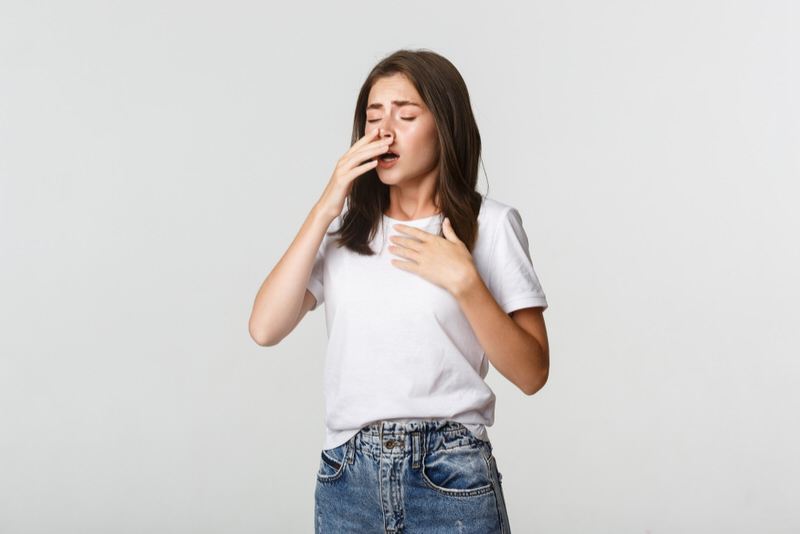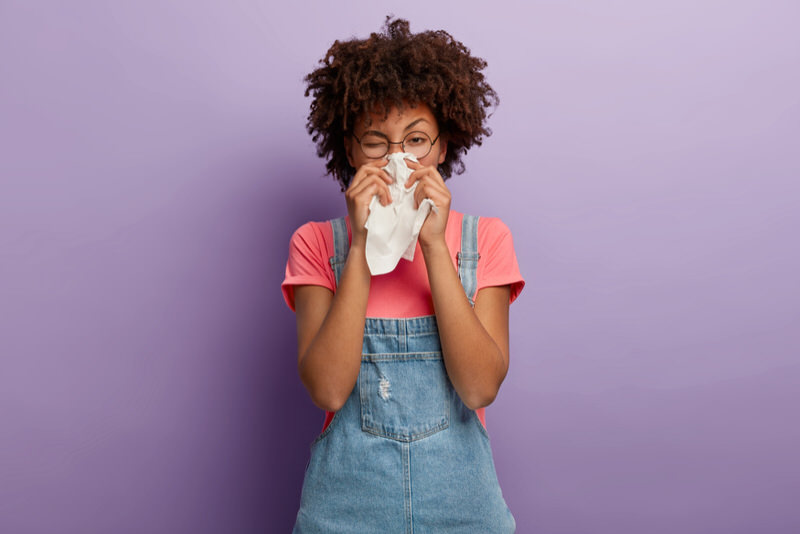Eating chocolate can cause sneezing due to “Photic Sneeze Reflex.” About 18-35% of the population is affected by this hereditary condition. Eating chocolate causes the nerves in our eyes and nose to get tangled up and send confusing signals to the brain, causing you to sneeze. When the brain receives those mixed signals, it triggers a sneezing reaction. To determine the severity of your condition, you have to visit your doctor.
Who doesn’t love chocolate? Imagine having to avoid chocolate because eating it can cause you to sneeze uncontrollably.
Note that sneezing after eating chocolate and being allergic to chocolate are 2 different things. So it might be possible that you’re not allergic to chocolate and might just be facing chocolate sensitivity.
Chocolate allergy vs. chocolate sensitivity
There’s a difference between chocolate allergy and chocolate sensitivity.
The next time you sneeze a lot after eating chocolate, take note of your symptoms to share with your doctor to see if it’s truly chocolate or some ingredient in what you’re eating that’s causing either sensitivity or an allergic reaction.
Chocolate allergy
Chocolate allergies are caused due to an adverse impact on the levels of immunoglobulin E (IgE) within the immune system.
A high level of histamine is released within the bloodstream. The chemicals released from chocolate allergy will affect your eyes, throat, nose, lungs, skin, and digestive system.
Symptoms of a chocolate allergy include:
1. Shortness of breath
After taking the first bite of the chocolate, breathing becomes difficult due to blockage of airways, wheezing, and excessive coughing.
2. Hives
Hives and rashes are some skin reactions often caused due to an allergic reaction caused by eating chocolate. However, in most severe situations, you may suffer from eczema, a skin problem faced due to eating chocolate regularly.
3. Migraine
Migraine headaches are a significant cause of chocolate allergy. Pain will burst at the front side of your forehead, followed by blurred vision, vomits, nausea, pain in your jaws and teeth. Besides drinking lots of water and taking painkillers, avoiding chocolate is your only option.
4. Sneezing

Sneezing is what shows that you have a chocolate allergy. A runny nose and constant sneezing are signs you should stop eating chocolate.
5. Swelling of lips, throat, and tongue
Your lips will swell up, accompanied by itching on the mouth, tongue, or throat. All this itching is because this yummiest thing is totally unacceptable to your body.
The most severe case of chocolate allergy, which may lead to a life-threatening situation, is called anaphylaxis.
Chocolate sensitivity
Being allergic to chocolate is a very rare condition. An intolerance or sensitivity to chocolate is a reaction to certain chocolate ingredients on your gastrointestinal system rather than the immune system.
Being sensitive to chocolate can cause acne, bloating, constipation, headaches, skin rash, and an upset stomach.
Ingredients that might be blamed for your chocolate sensitivity goes as followed:
1. Dairy products
White chocolate and milk chocolate usually only contain a small amount of milk. However, for someone whose body can’t handle lactose from cow milk, you might get a reaction after eating a milk chocolate bar and think it’s the chocolate causing it.
Instant symptoms include nausea, cough, diarrhea, and abdominal cramps. In severe cases, the person may go into anaphylactic shock.
For such people, bittersweet and dark chocolates are a good choice. Or you can also find some good quality dairy-free versions of chocolate to enjoy chocolates as much as you can.
2. Peanuts
Peanut butter, whole nuts, and sometimes fruits are also used to enhance the flavor of chocolates. But this becomes a problem for chocolate lovers who are allergic to peanuts and nuts. If this is the reason for your sensitivity, be careful to read the ingredients next time you buy something like a chocolate bar.
3. Soy
Soy lecithin is an emulsifier used to keep all the ingredients in the chocolate at room temperature.
Most people are allergic to the protein in soy. Mild allergy to soy protein will cause you a runny nose, sneezing, digestive problems, and skin rashes, and at times eczema.
4. Cocoa bean
The cocoa bean is a dominant ingredient within chocolate. Therefore, eating chocolate containing a higher percentage of cocoa will trigger an allergic reaction related to chocolate sensitivity.
Should I go to a doctor for a chocolate allergy?
If sneezing has become common every time you try to eat chocolate, going to an allergist will help you determine the severity of your case.
The doctor will perform skin prick tests, blood tests, and diet elimination techniques to determine what is causing uncontrollable sneezing.
The allergist will help you determine whether you should avoid chocolate at all or sacrificing some of the ingredients within the chocolate will be sufficient.
FAQs
What is the best alternative to chocolates?
Carob is the best and even healthier alternative to eating chocolates. Not only is it suitable for people allergic or sensitive to chocolates, but it also is high in fiber, contains low sugar and fat, and is completely caffeine-free. Moreover, the carob resembles chocolate in color and taste as well.
Is there a way of curing chocolate allergy?
Unfortunately, there is no absolute cure way of curing chocolate allergy. You can, however, work to reduce the symptoms with the advice given by your allergist.
What is cross-reactivity?
Cross-reactivity refers to the reaction of your immune system due to a compound in the chocolate that has the same chemical properties as compared to tobacco, coffee, and ragweed. Caffeine in chocolate may also be a leading cause of triggering an allergic reaction.


